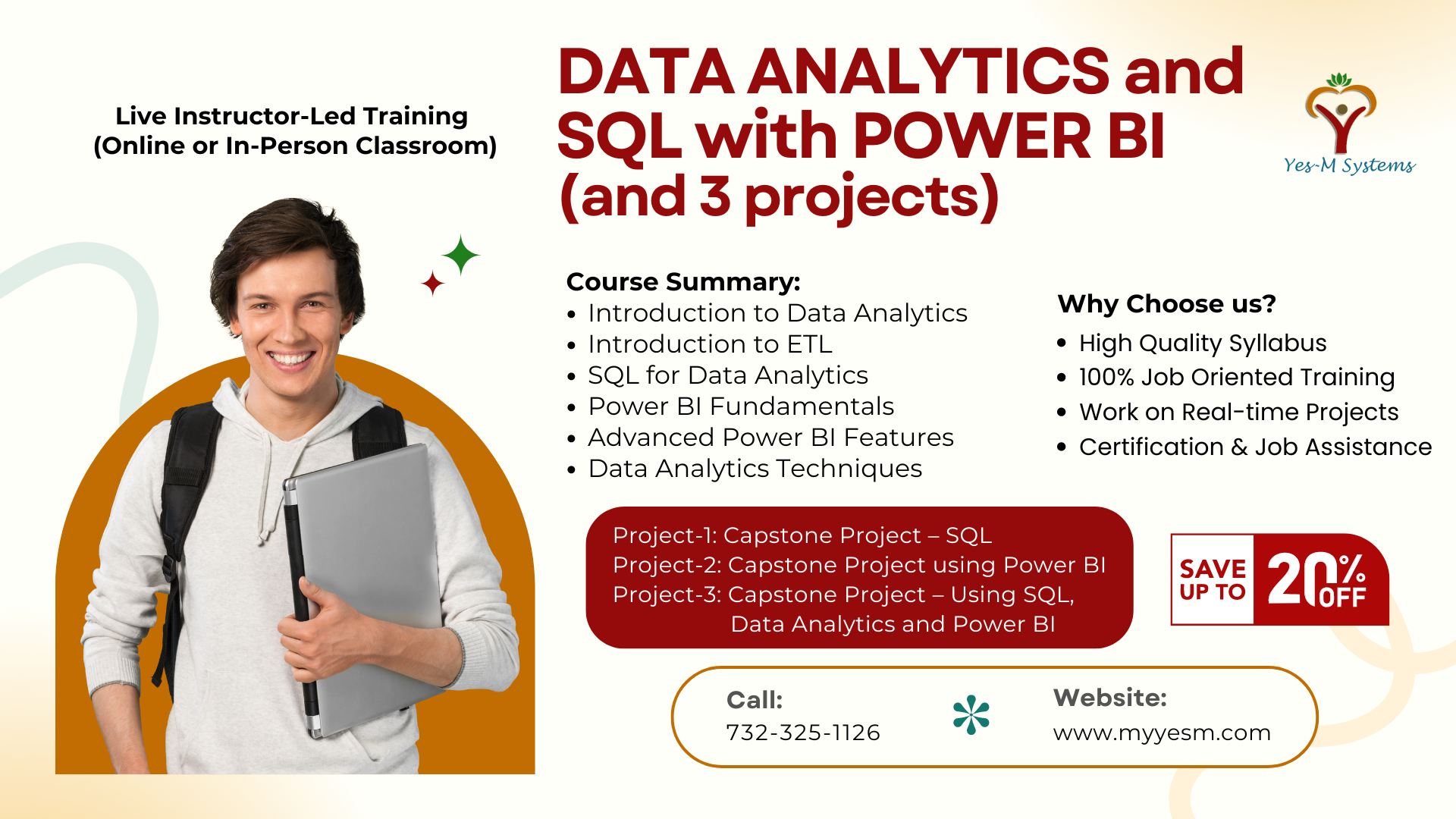DATA ANALYTICS with SQL with POWER BI
Includes 3 Projects and advanced topics
Audience: Students with or without IT experience or knowledge
Student Location: To students from around the world
Delivery Method: Instructor-Led – Live Training Classroom and/or Online
Data Analytics with Power BI and 3 Projects
Get ready to level up your skills with our Data Analytics with Power BI course. With the help of our expert instructors, you’ll learn how to analyze and visualize data like never before. Gain hands-on experience with real-world projects and learn how to analyze, visualize and present data using Power BI. Take your career to new heights with this in-demand skillset.
Key Features
Introduction to Data Analytics
- What is Data Analytics?
- Importance of data in business
- Overview of the analytics process: Descriptive, Diagnostic, Predictive, and Prescriptive
- Data Types and Sources
- Structured vs Unstructured Data
- Internal vs External Data Sources
- Data-Driven Decision Making
- Using data to inform business decisions
- Case studies
Introduction to ETL
- Definition of ETL
- Importance of ETL in data integration and data warehousing
- Real-world ETL use cases
- Overview of ETL tools (e.g., Informatica, Talend, Apache Nifi, Pentaho)
- Data Extraction
- Types of data sources (databases, files, APIs, cloud storage, etc.)
- Structured vs. unstructured data
- Extraction methods:
- Full extraction
- Incremental extraction
- Database connectivity (ODBC, JDBC, API connections)
- Extracting from different sources (SQL, NoSQL, flat files, web services)
SQL for Data Analytics
- Introduction to SQL
- Overview of relational databases (MySQL, SQL Server, PostgreSQL, etc.)
- SQL vs NoSQL databases
- Data Retrieval with SQL
- SELECT, FROM, WHERE: Basic data queries
- Filtering with conditions (AND, OR, NOT)
- Sorting and limiting results with ORDER BY and LIMIT
- Joins and Data Integration
- INNER JOIN, LEFT JOIN, RIGHT JOIN, FULL OUTER JOIN: Combining data from multiple tables
- Cross Joins and Self Joins
- Aggregating Data
- GROUP BY and HAVING for data summarization
- Using aggregate functions (COUNT, SUM, AVG, MIN, MAX)
- Advanced SQL
Subqueries and Nested Queries
Window Functions for advanced analytics (ROW_NUMBER, RANK, etc.)
Common Table Expressions (CTEs)
Data Manipulation
- INSERT, UPDATE, DELETE: Modifying data in tables
- Views
- Creating and managing virtual tables for reusable queries
- Connecting SQL to Power BI
- Using SQL queries to import data into Power BI
Project-1: Capstone Project – SQL
Power BI Fundamentals
- Introduction to Power BI
- What is Power BI? Overview of its components (Power BI Desktop, Service, Mobile)
- Setting up the Power BI environment
- Data Import and Transformation
- Connecting to different data sources (Excel, CSV, SQL, etc.)
- Data loading and extraction from databases (SQL, cloud services)
- Data transformation using Power Query (cleaning, shaping, merging data)
- Creating Data Models
- Understanding Power BI’s data model
- Creating relationships between tables
- Defining calculated columns and measures
- Using DAX (Data Analysis Expressions) for advanced calculations
- Building Visualizations
- Overview of built-in Power BI visuals (Bar Charts, Line Charts, Pie Charts, etc.)
- Customizing visualizations (formatting, tooltips, slicers)
- Creating interactive dashboards
- Filters and slicers for dynamic data exploration
- Publishing Reports
- Publishing reports to Power BI Service
- Sharing reports and dashboards
Advanced Power BI Features
- Advanced DAX (Data Analysis Expressions)
- Complex calculations using DAX (CALCULATE, IF, SWITCH, etc.)
- Time intelligence functions (Year-to-Date, Month-over-Month comparisons)
- Hierarchies and Drill-through
- Creating data hierarchies for drilling down into data
- Using Drill-through reports for detailed data analysis
Project-2: Capstone Project using Power BI
Data Analytics Techniques
- Exploratory Data Analysis (EDA)
- Identifying key patterns and insights in data
- Detecting outliers, missing values, and data anomalies
- Descriptive Analytics
- Summarizing data using statistical measures (mean, median, mode, etc.)
- Creating summary reports in Power BI
- Predictive Analytics with Power BI
- Advanced Power BI Customizations
- Using Power BI themes and custom visuals
Project-3: Capstone Project – Using SQL, Data Analytics and Power BI

FAQ'S
Do I get any discount on the course?
Yes, you get two kinds of discounts. They are group discount and referral discount. Group discount is offered when you join as a group, and referral discount is offered when you are referred from someone who has already enrolled in our training.
Who will provide the environment to execute the Practicals ?
The trainer will give Server Access to the course seekers, and we make sure you acquire practical hands-on training by providing you with every utility that is needed for your understanding of the course.
What is the qualification of the trainer?
The trainer is a certified consultant and has significant amount of experience in working with the technology.
Does MyyesM accept the course fees in installments?
Yes, we accept payments in two installments.
How does MyyesM Refund Policy work?
If you are enrolled in classes and/or have paid fees, but want to cancel the registration for certain reason, it can be attained within first 2 sessions of the training. Please make a note that refunds will be processed within 30 days of prior request.
Course Testimonials
I have no idea where to start. Because of Yes M Systems, I'm earning a decent amount of salary. The expertise in Data Science I acquired from them has made my life. Thank you to all the encouraging instructors.

Sharmistha
In the majority of online course-providing platforms, you are always left out on one topic or the other. With Yes-M Systems, you never experience the same. They cover every little aspect of the topic so elaborately and they make complex areas super easy.

Amrita
I guess I made the right choice by going with Yes M Systems Data Science Course with a special focus on Machine Learning, SQL and PowerBI. The course teaches basic as well as advanced topics clearly.

Manasvi R
Disclaimer: Yes-M Systems and/or their instructors reserve the right to make any changes to the syllabus as deemed necessary to best fulfill the course objectives. Students registered for this course will be made aware of any changes in a timely fashion using reasonable means.

